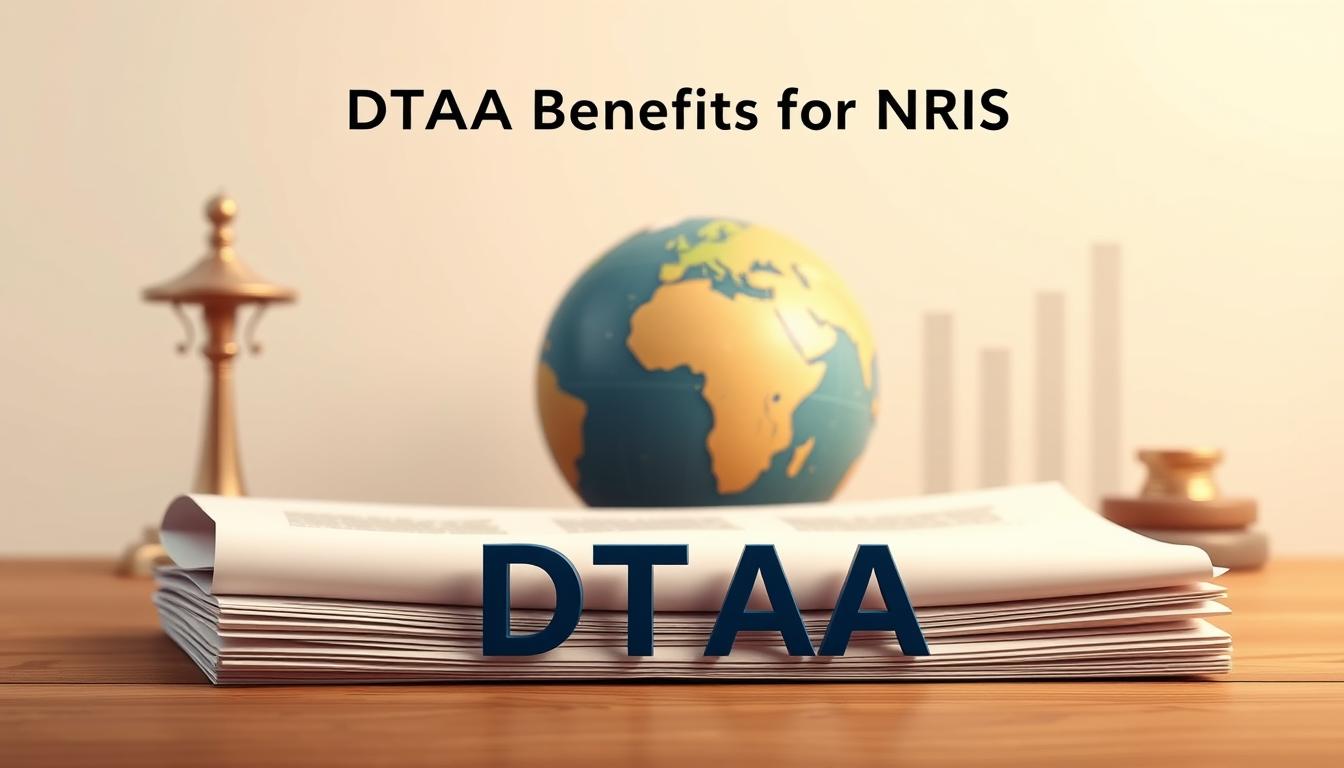NRI Income Tax – Navigating Taxes for Non-Resident Indians

Over 32 million Non-Resident Indians (NRIs) help India’s economy a lot. They face tough tax challenges. Knowing about NRI income tax is key to handling money matters across borders.
Managing NRI income tax needs smart planning and knowing Indian tax rules well. As an NRI, you deal with special money issues. You must pay attention to where you live, your income, and tax rules.
Your tax path includes learning about foreign income, smart investments, and avoiding double taxes. The tax system in India for NRIs has its ups and downs. It’s all about making smart money choices.
Key Takeaways
- NRIs must understand specific tax residency classifications
- Different income sources have unique tax implications
- Proper documentation is critical for tax compliance
- Double Taxation Avoidance Agreements provide significant benefits
- Strategic tax planning can optimize financial outcomes
Understanding NRI Tax Status and Residential Classification
For Non-Resident Indians (NRIs), figuring out taxes can be tough. Your taxes depend on how long you stay and where your money comes from. Knowing FEMA rules is key for good tax planning.
The Indian tax system sorts people by where they live. This affects how much tax you pay and what you need to report.
Determining Your NRI Status Under FEMA Guidelines
FEMA rules help figure out if you’re an NRI. You’re an NRI if you meet certain rules about living in India:
- Stayed in India for less than 182 days in the previous financial year
- Left India for work or business
- Have big ties to other countries
Impact of Stay Duration on Tax Residency
How long you live in India matters for taxes. The tax rules use certain times to decide if you’re a resident:
| Stay Duration | Residential Status | Tax Implications |
|---|---|---|
| Less than 182 days | Non-Resident | Taxed only on Indian income |
| More than 182 days | Resident | Taxed on all income |
Different Categories of NRI Status
Knowing the different NRI statuses helps with taxes. You might be:
- Resident but Not Ordinarily Resident (RNOR)
- Resident
- Non-Resident
Each status has its own tax rules and what you need to do. Talking to a tax expert can help figure out your status and plan your taxes.
Essential Tax Obligations for Non-Resident Indians
Navigating nri income tax can be complex for non-resident Indians. It’s important to know your tax duties. This helps you follow Indian income tax rules.
As an NRI, your tax duties depend on a few things. Here are the main points to remember:
- Income source determination
- Residential status classification
- Taxable income categories
- Reporting requirements
The Indian income tax for NRIs has its own rules. You usually only pay tax on income from India.
| Income Type | Taxability for NRIs | Tax Rate |
|---|---|---|
| Indian-sourced Income | Fully Taxable | As per standard tax slab |
| Foreign-sourced Income | Not Taxable in India | Exempt |
| Rental Income | Taxable after Deductions | Graduated rates |
Important reporting duties include:
- Filing income tax returns
- Declaring all Indian-sourced income
- Maintaining proper documentation
- Paying applicable taxes on time
Pro tip: Always consult with a tax professional who specializes in NRI taxation to ensure full compliance and optimize your tax strategy.
Understanding your tax obligations is the first step to financial peace of mind as an NRI.
Foreign Income Taxation: Double Taxation Avoidance Agreement (DTAA)

For Non-Resident Indians (NRIs), dealing with foreign income taxes can be tough. The Double Taxation Avoidance Agreement (DTAA) helps a lot. It makes sure you don’t pay taxes twice on the same money in different places.
DTAA benefits protect NRIs from being taxed twice. This agreement helps you pay less tax and get fair treatment for your foreign income.
Countries with DTAA Benefits
India has DTAA agreements with many countries. This gives big tax breaks to NRIs. Some important countries with good DTAA deals include:
- United Arab Emirates
- United States
- United Kingdom
- Singapore
- Canada
How to Claim DTAA Relief
To get tax relief through DTAA, follow these steps:
- Get a Tax Residency Certificate from your home country.
- Send Form 10F to the Indian tax people.
- Show proof of income and taxes paid abroad.
- Use DTAA rules to figure out your tax.
Documentation Requirements for DTAA
Having the right documents is key for DTAA benefits. You’ll need:
- Proof of foreign income
- Tax residency certificate
- Bank statements
- Tax returns from both countries
“Understanding DTAA can save you a lot on foreign income taxes” – Tax Expert
By using DTAA wisely, you can cut down your taxes as an NRI.
NRE and NRO Accounts: Tax Implications and Benefits

It’s important for non-resident Indians to know about NRE and NRO accounts. These special bank accounts have tax benefits that can help your money grow.
NRE (Non-Resident External) accounts are great for NRIs who want to save on taxes. You can put foreign money in Indian rupees. This gives you big advantages:
- Complete tax exemption on interest earned
- Full repatriability of funds
- No restrictions on deposit amounts
- Protection against exchange rate fluctuations
NRO (Non-Resident Ordinary) accounts are for managing money from India. The tax rules for NRE and NRO accounts are different.
| Account Type | Tax Treatment | Repatriation |
|---|---|---|
| NRE Account | Fully Tax-Exempt | 100% Allowed |
| NRO Account | Taxable Interest | Limited Repatriation |
NRE accounts have great tax benefits. Interest earned is completely tax-free. This makes them perfect for NRIs who want to save on taxes. Your NRE account can hold foreign money without paying Indian income tax.
Strategic financial planning begins with understanding the nuanced tax landscape for NRI banking.
When thinking about NRE account tax benefits, remember they offer flexibility and big financial gains. Talking to a tax expert can help you use these benefits well. It also makes sure you follow Indian banking rules.
Income Sources and Their Tax Treatment for NRIs

Navigating nri income tax is complex. It involves understanding different income types and their tax rules. Non-resident Indians face unique challenges managing money across borders.
Your income sources as an NRI affect your taxes. Knowing how taxes work for each income type is key for good financial planning.
Rental Income Taxation
Rental income for NRIs has special tax rules. The tax treatment depends on several important factors:
- Location of the property
- Residential status of the NRI
- Gross annual value of the property
NRIs must report rental income in their Indian tax returns. This is true even if the income is earned abroad. The tax rate is usually between 20-30%, based on your situation.
Investment Income Tax Considerations
Investment income for NRIs includes different financial products with unique tax rules:
| Investment Type | Tax Rate | Reporting Requirement |
|---|---|---|
| Fixed Deposits | 10-20% | Mandatory reporting |
| Mutual Funds | 10-15% | Capital gains tax applies |
| Stock Market Investments | 10-20% | Securities transaction tax |
Business Income Tax Guidelines
NRIs with business income face complex tax rules. Important things to consider include:
- Determining permanent establishment status
- Compliance with international tax treaties
- Proper documentation of business income
Managing nri income tax well needs careful planning and expert advice. A tax expert in international taxes can help you make the most of your finances.
RBI Compliance and FEMA Regulations for NRIs

Understanding RBI compliance and FEMA rules is key for NRIs. The Reserve Bank of India (RBI) has rules you need to know. These rules help with your money matters.
Important parts of RBI and FEMA rules include:
- Reporting needs for money sent abroad
- Rules on some money deals
- Rules for foreign exchange management
- What you need for sending money overseas
FEMA rules help with money deals across borders. As an NRI, you should know a few things:
- You must tell about foreign assets
- There are limits on cash and asset moves
- There are special rules for investing in India
- Rules for bringing money earned abroad back home
Knowing RBI rules helps avoid legal trouble. Having the right documents and reporting on time is key. It keeps your money dealings safe and smooth.
Keeping up with FEMA rules protects your money and avoids fines.
NRIs need to stay current with RBI updates. Talking to NRI banking experts can help a lot. They know how to deal with these rules well.
Tax Planning Strategies for Non-Resident Indians
Planning taxes for NRIs needs a smart plan and knowing the rules. As a non-resident Indian, you can lower your taxes and follow Indian laws.
Good nri tax planning means picking the right investments. It also means knowing how to move money around without trouble.
Strategic Investment Options for Tax Optimization
Choose investments that give you good returns but don’t cost too much in taxes. Here are some good choices:
- Tax-saving mutual funds
- Unit Linked Insurance Plans (ULIPs)
- Public Provident Fund (PPF)
- National Pension System (NPS)
- Equity-linked savings schemes
Navigating Repatriation Rules
It’s important to know how to move money from India to your home country. Here are some things to think about:
- Limits on fund transfers
- Documentation requirements
- Tax implications of international transfers
- Compliance with FEMA regulations
“Smart nri tax planning is about maximizing financial efficiency while staying fully compliant with legal frameworks.”
Think about taxes and talk to experts before making any big decisions. They know a lot about NRI money management.
Filing Tax Returns: Process and Documentation
Filing taxes as a non-resident Indian can seem hard. But knowing the steps makes it easier. You must follow rules when you file your taxes to stay in line with Indian laws.
The process for filing taxes needs careful planning and focus. You’ll need to collect important documents before you start:
- Passport copy with NRI status proof
- Form 26AS (tax credit statement)
- Bank statements for NRE and NRO accounts
- Income documentation from all sources
- Investment proofs and tax deduction certificates
To file taxes right, you must use the right forms. Form ITR-2 is for non-residents with foreign income. You must report all income from around the world, like from investments and jobs.
Pro Tip: Always keep detailed records of your international money dealings. This makes filing taxes easier.
Deadlines are very important when filing taxes. The main deadline is July 31st for the last financial year. If you miss it, you could face penalties and legal issues.
Online platforms have made filing taxes easier. You can now do most of it online through the Income Tax Department’s website. This makes the process quicker and simpler.
Common Tax Mistakes NRIs Should Avoid
Managing taxes in India can be tricky for NRIs. Many make big tax mistakes without knowing it. These errors can cause big financial problems. It’s important to know these common mistakes to stay on the right side of tax laws.
Here are some common mistakes NRIs make with their taxes:
- Misclassifying income sources and failing to report global income correctly
- Overlooking tax deduction opportunities specific to NRI status
- Neglecting to maintain accurate financial documentation
- Ignoring Double Taxation Avoidance Agreement (DTAA) benefits
Incorrect residential status determination is a big mistake. Your tax liability depends on how the Income Tax Department sees your status. Getting this wrong can lead to big penalties.
Another big mistake is not reporting foreign income right. NRIs need to document all income, like from investments, rental properties, and business. Not doing this well can get you in trouble with tax authorities.
To avoid these mistakes, try these tips:
- Get help from a tax expert who knows about NRIs in India
- Keep up with the latest tax rules
- Keep all your financial records in order
- Use DTAA to get tax breaks
By tackling these common tax issues, you can manage your finances better. And you’ll follow Indian tax laws without trouble.
Most Read:- NRI Tax Planning: Smart Ways to Save Taxes Abroad
Conclusion
Navigating NRI income tax needs careful planning and knowing the rules well. As a Non-Resident Indian, you must watch tax laws closely. This helps you manage your taxes better.
Understanding DTAA benefits and knowing where you live are key. Keeping good records is also important. This way, you can handle your taxes well.
Managing NRI income tax can seem hard, but you can do it. Good tax planning can lower your taxes and help your money grow. Every financial choice affects your taxes.
Getting help from tax experts is very important. They know a lot about international taxes. They can give you advice that fits your money situation.
They can explain RBI rules and FEMA laws. They can also help you plan your taxes for different kinds of money you make.
Learning about NRI income tax helps keep your money safe. Always be ready to learn new tax rules. With the right help, you can handle your taxes as a Non-Resident Indian.
FAQ
How do I determine my NRI tax status?
Your NRI tax status depends on how long you stay in India. If you stay less than 182 days in a year, you’re an NRI. FEMA guidelines help figure out your status based on your stay and where you live.
What are the key tax obligations for NRIs?
As an NRI, you must report any income from India. This includes rental income, investments, and business earnings. You also need to report foreign income and follow RBI and FEMA rules. Knowing your tax obligations is key to staying compliant.
How can I avoid double taxation?
The Double Taxation Avoidance Agreement (DTAA) helps you avoid paying taxes twice. India has DTAA agreements with many countries. You can claim tax relief by providing the right documents. This way, you can reduce your Indian tax liability.
What’s the difference between NRE and NRO accounts?
NRE accounts are fully repatriable and tax-free. They hold foreign earnings in Indian rupees. NRO accounts manage income earned in India and have different tax rules. Each account type meets different financial needs for NRIs.
What income sources are taxable for NRIs in India?
NRIs are taxed on income from India. This includes rental income, capital gains, business income, and salary. Foreign income may also be taxable, depending on your status and DTAA provisions.
How do I file tax returns as an NRI?
You can file your NRI tax returns online. You’ll need documents like Form 26AS and bank statements. Using digital platforms or a tax professional can help ensure you file correctly.
What common tax mistakes should NRIs avoid?
Avoid misreporting income and failing to declare foreign assets. Don’t overlook DTAA benefits or miss filing deadlines. Keeping up with tax rules and seeking professional advice can prevent mistakes.
Are there tax planning strategies for NRIs?
Yes, NRIs can plan taxes strategically. This includes investing in tax-saving instruments and using DTAA benefits. Managing NRE and NRO accounts and understanding repatriation rules are also key. A tax expert can help with a detailed plan.
What RBI and FEMA regulations should NRIs know?
NRIs must follow RBI rules on fund transfers and investment limits. FEMA guidelines cover foreign exchange transactions. You need to report overseas investments and keep proper documentation for financial dealings.
How does my stay duration impact tax residency?
Your tax residency changes based on your stay in India. Staying less than 182 days makes you an NRI. This affects your tax liability and how your income is taxed in India.


